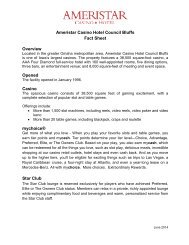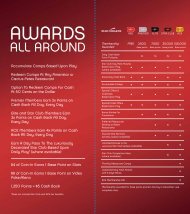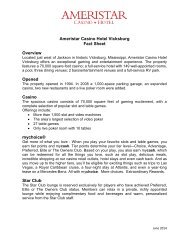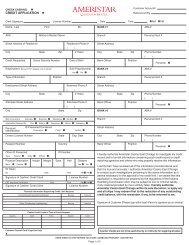Iowa has a graduated wagering tax equal to 5% of the first $1.0 million of annual adjusted gross receipts, 10% ofthe next $2.0 million of annual adjusted gross receipts and 22% of annual adjusted gross receipts over $3.0 millionfor an excursion gambling boat. In addition, the state charges other fees on a per-customer basis. Additionally,ACCBI pays the City of Council Bluffs a fee equal to $0.50 per passenger. Under the Operator’s Contract, ACCBIalso pays the Association a graduated fee equal to 5% of the first $30 million of annual adjusted gross receipts, 4%of the next $30 million of annual adjusted gross receipts, 3% of the next $30 million of annual adjusted grossreceipts, 2% of the next $30 million of annual adjusted gross receipts and 0.5% of the next $30 million of annualadjusted gross receipts (up to $150 million of annual adjusted gross receipts).All persons participating in any capacity at a gaming facility, with the exception of certified law enforcementofficers while they are working for the facility as uniformed officers, are required to obtain occupational licensesfrom the Iowa Gaming Commission. All such licenses must be renewed every two years. The Iowa GamingCommission has broad discretion to deny or revoke any occupational license.If the Iowa Gaming Commission decides that a gaming law or regulation has been violated, the Iowa GamingCommission has the power to assess fines, revoke or suspend licenses or to take any other action as may bereasonable or appropriate to enforce the gaming rules and regulations.ACCBI is subject to licensure by the Alcoholic Beverages Division (“ABD”) of the Iowa Department ofCommerce, which administers and enforces the laws of the State of Iowa concerning alcoholic beverages.Additionally, ACCBI is subject to liquor ordinances adopted by local authorities. A local authority may adoptordinances governing establishments that are located within their jurisdiction. Local ordinances may be morerestrictive than state law, but they may not conflict with state law. The ABD and the local authorities have fullpower to suspend or revoke any license for the serving of alcoholic beverages.Indiana<strong>Ameristar</strong> conducts its Indiana gaming operations through its indirect wholly owned subsidiary, RIHAcquisitions IN, LLC, which owns and operates Resorts East Chicago in East Chicago, Indiana. The ownership andoperation of casino facilities in Indiana are subject to extensive state and local regulation, including primarily thelicensing and regulatory control of the Indiana Gaming Commission (the “Commission”). The Commission is givenextensive powers and duties for administering, regulating and enforcing riverboat gaming in Indiana.Pursuant to the Indiana Riverboat Gaming Act, as amended (the “Indiana Act”), the Commission is authorized toaward up to 11 gaming licenses to operate riverboat casinos in the State of Indiana, including five to countiescontiguous to Lake Michigan in northern Indiana, five to counties contiguous to the Ohio River in southern Indianaand one to a county contiguous to Patoka Lake in southern Indiana, which was subsequently relocated to FrenchLick, Indiana. Referenda required by the Indiana Act to authorize the five licenses to be issued for countiescontiguous to Lake Michigan have been conducted and gaming has been authorized for the cities of Hammond, EastChicago, and Gary in Lake County, Indiana, and for Michigan City in LaPorte County, Indiana, to the east of LakeCounty.The Indiana Act strictly regulates the facilities, persons, associations and practices related to gaming operationspursuant to the police powers of Indiana, including comprehensive law enforcement provisions. The Indiana Actvests the Commission with the power and duties of administering, regulating and enforcing the system of riverboatgaming in Indiana. The Commission’s jurisdiction extends to every person, association, corporation, partnership andtrust involved in riverboat gaming operations in Indiana.The Indiana Act requires the owner of a riverboat gaming operation to hold an owner’s license issued by theCommission. To obtain an owner’s license, the Indiana Act requires extensive disclosure of records and otherinformation concerning an applicant. Applicants for licensure must submit a comprehensive application andpersonal disclosure forms and undergo an exhaustive background investigation prior to the issuance of a license. Theapplicant must also disclose the identity of every person holding an ownership interest in the applicant. Any personholding an interest of 5% or more in the applicant must undergo a background investigation and be licensed. TheCommission has the authority to request specific information on or license anyone holding an ownership interest.16
Each license entitles the licensee to own and operate one riverboat and gaming equipment as part of a gamingoperation. In May 2003, the Indiana Act was amended to allow a person to hold up to 100% of up to two individuallicenses.Each initial owner’s license runs for a period of five years. Thereafter, the license is subject to renewal on anannual basis upon a determination by the Commission that the licensee continues to be eligible for an owner’slicense pursuant to the Indiana Act and the rules and regulations adopted thereunder. The Indiana Act requires that alicensed owner undergo a complete investigation every three years. If for any reason the license is terminated, theassets of the riverboat gaming operation cannot be disposed of without the approval of the Commission.Furthermore, the Indiana Act requires that officers, directors and employees of a gaming operation be licensed.A holder of a gaming license is required to post a bond with the Commission in an amount that the Commissiondetermines will adequately reflect the amount that a local community will expend for infrastructure and otherfacilities associated with a riverboat operation. A licensee must hold insurance of the type and amount deemednecessary by the Commission.The Commission has also promulgated a rule mandating that licensees maintain a cash reserve to protect patronsagainst defaults in gaming debts. The cash reserve is to be equal to a licensee’s average payout for a three-dayperiod based on the riverboat’s performance during the prior calendar quarter. The cash reserve can consist of cashon hand, cash maintained in Indiana bank accounts and cash equivalents not otherwise committed or obligated.The Indiana Act does not limit the maximum bet or per patron loss. Each licensee sets minimum and maximumwagers on its own games. Wagering may not be conducted with money or other negotiable currency. No personunder the age of 21 is permitted to wager, and wagers may only be taken from persons present on a licensedriverboat.The Commission places special emphasis on the participation of minority business enterprises (“MBEs”) andwomen business enterprises (“WBEs”) in the riverboat industry. Each licensee is required to submit annually to theCommission a report that includes the total dollar value of contracts awarded for goods and services and thepercentage awarded to MBEs and WBEs, respectively. The Commission has previously required licensees toestablish goals of expending 10% of the total dollars spent on the majority of goods and services with MBEs and 5%with WBEs. In <strong>2007</strong>, the Commission conducted a disparity study entitled “A Disparity Study for the Commission,May <strong>2007</strong>” (the “Disparity Study”) to determine whether there existed a gap between the capacity of MBEs andWBEs and the utilization thereof by riverboat casinos in Indiana. The Disparity Study concluded that, with theexception of WBE purchases in the construction area, there was no “disparity.” As a result, the Commission issuedResolution <strong>2007</strong>-58 to mandate that annual goals for expenditures to WBEs for the purchase of construction goodsand services shall be set at 10.9%. For expenditures in all other areas, the Commission has taken the position that thecapacity percentages set forth in the Disparity Study for MBEs and WBEs, respectively, are goals and targets inwhich best faith efforts of each licensee are expected. Failure to meet these goals will be scrutinized heavily by theCommission.A licensee may not lease, hypothecate, borrow money against or lend money against an owner’s riverboatgaming license. An ownership interest in an owner’s riverboat gaming license may only be transferred in accordancewith the regulations promulgated under the Indiana Act.Indiana state law stipulates a graduated wagering tax with a starting tax rate of 15% and a top rate of 35% foradjusted gross receipts in excess of $150,000,000. In addition to the wagering tax, an admissions tax of $3 perturnstile count is assessed. The Indiana Act provides for the suspension or revocation of a license if the wageringand admissions taxes are not timely submitted.A licensee may enter into debt transactions that total $1,000,000 or more only with the prior approval of theCommission. Such approval is subject to compliance with requisite procedures and a showing that each person withwhom the licensee enters into a debt transaction would be suitable for licensure under the Indiana Act.The Commission may subject a licensee to fines, suspension or revocation of its license for any act that is inviolation of the Indiana Act or the regulations of the Commission or for any other fraudulent act. In addition, theCommission may revoke an owner’s license if the Commission determines that the revocation of the license is in thebest interests of the State of Indiana.17
- Page 3 and 4: Dear Fellow Shareholders,I am pleas
- Page 5 and 6: Ameristar Black Hawk, which reporte
- Page 7 and 8: UNITED STATES SECURITIES AND EXCHAN
- Page 9 and 10: Unless the context indicates otherw
- Page 11 and 12: Ameristar St. Charles. Ameristar St
- Page 13 and 14: Ameristar Vicksburg. Ameristar Vick
- Page 16 and 17: Kansas CityAmeristar Kansas City co
- Page 18 and 19: Should additional gaming developmen
- Page 20 and 21: The Missouri Act provides for a buy
- Page 24 and 25: The Indiana Act provides that the s
- Page 26 and 27: after receiving notice that a perso
- Page 29 and 30: Pursuant to an amendment to the Col
- Page 31 and 32: There are various classes of retail
- Page 33 and 34: The Nevada Commission may, at its d
- Page 35 and 36: Item 1A. Risk FactorsThe gaming ind
- Page 37 and 38: two years, our gaming licenses in I
- Page 39 and 40: We have limited opportunities to de
- Page 41 and 42: The Ameristar Vicksburg site has ex
- Page 43 and 44: PART IIItem 5. Market for Registran
- Page 45 and 46: AMERISTAR CASINOS, INC.CONSOLIDATED
- Page 47 and 48: the rebranding, improving from an 1
- Page 49 and 50: The following table presents detail
- Page 51 and 52: Operating IncomeIn 2006, consolidat
- Page 53 and 54: At Ameristar St. Charles, we are ne
- Page 55 and 56: Historically, we have funded our da
- Page 57 and 58: Customer Rewards ProgramsOur custom
- Page 59 and 60: Item 7A. Quantitative and Qualitati
- Page 61 and 62: (a) 2. Financial Statement Schedule
- Page 63 and 64: ExhibitNumber Description of Exhibi
- Page 65 and 66: SIGNATURESPursuant to the requireme
- Page 67 and 68: MANAGEMENT’S ANNUAL REPORT ON INT
- Page 69 and 70: REPORT OF INDEPENDENT REGISTERED PU
- Page 71 and 72: AMERISTAR CASINOS, INC.CONSOLIDATED
- Page 73 and 74:
AMERISTAR CASINOS, INC.CONSOLIDATED
- Page 75 and 76:
InventoriesInventories primarily co
- Page 77 and 78:
Income taxesIncome taxes are record
- Page 79 and 80:
The Company recorded $5.6 million,
- Page 81 and 82:
Senior credit facilitiesIn November
- Page 83 and 84:
Future minimum lease payments requi
- Page 85 and 86:
Years ended December 31,2007 2006 2
- Page 87 and 88:
The unaudited pro forma consolidate
- Page 89 and 90:
STOCK PRICE PERFORMANCEThe followin









